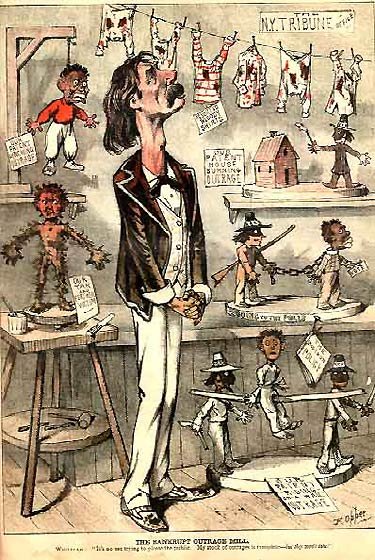
1880 Frederick Burr Opper Cartoon from Puck, titled: The Bankrupt Outrage Mill (showing bloody shirts, lynchings, and other forms of racial violence)
Virginia Governor Bob McDonnell’s break with political correctness and resumption of the practice avoided by two democrat party predecessors of declaring April to be “Confederate History Month” provoked the American left to open fire with all the batteries of the establishment media and the progressive blogosphere.
The contemporary left enthusiastically identifies with the 19th century radical abolitionist movement (which had so much to do with starting the Civil War) and is determined to ruthlessly suppress any expression of enthusiasm or affection for the Lost Cause.
The theoretical defense of the Southern political perspective and the rights of the states, remembrance of Confederate military victories, admiration for Confederate leaders, and any defense of the Southern Antebellum way of life are all treated as the gravest of thought crimes.
From the point of view of the Left, the politics of Slavery is all. Just as Harry Reid declared opposition to the Health Care Bill to be equivalent to opposing Civil Rights, the liberal commentariat characteristically treats any form of positive perspective on the Confederate Cause as tantamount to racism and an active defense of the Peculiar Institution.
Jon Meacham, in the New York Times, lays down the liberal law, insisting on the absolute centrality of Slavery to any interpretation of Civil War history.
If the slaves are erased from the picture [of the Civil War], then what took place between Sumter and Appomattox is not about the fate of human chattel, or a battle between good and evil. It is, instead, more of an ancestral skirmish in the Reagan revolution, a contest between big and small government.
We cannot allow the story of the emancipation of a people and the expiation of America’s original sin to become fodder for conservative politicians playing to their right-wing base. That, to say the very least, is a jump backward we do not need.
In other words, if the issues of states rights, popular sovereignty, and Constitutional limitations on federal power going back one hundred and fifty years are allowed to be raised, discussed, and argued, there is no telling what might come of it. Who knows? Some more complex interpretation beyond a simple drama featuring wicked slave owners and oppressed darkies might interfere with universal acceptance of the American left’s self-justifying narrative of radical leadership first overthrowing Slavery, then marching on to deliver first Civil Rights, then National Health Care.
It is vital to enforce a politically correct, crudely simplified version of history, so that history can be used as a credential by those who claim to be enforcing History’s will and decrees on the rest of us.
Invoking racial politics and inflaming sectional animosity at the expense of the South is a very old political game, as the 1880 cartoon above testifies. Americans were already tired of the practice in the 19th century. In the immediate aftermath of the Civil War, the radical Benjamin Butler, then a Congressman, exhibited on the floor of the House of Representative a blood-stained shirt belonging to an Ohio carpetbagger who had been whipped by night riders in Mississippi. This kind of divisive and manipulative politics of accusation came to be referred to derisively as “waving the bloody shirt.”
Bob McDonnell is just the most recent victim of the left’s habit of waving the bloody shirt in order to bully and intimidate its opponents.
Like myself, John R. Guardino had no relatives in the United States at the time of the Civil War. He discusses at some length, quoting Senator James Webb along the way, why the attacks on Governor McDonnell are so dishonest.
And, just for the record, I’d like to note that Virginia obviously did not secede to defend Slavery. Virginia seceded in order to avoid supplying troops to be used to conquer and invade her fellow states. Virginia went to war only to defend herself and other fraternal states from invasion.





